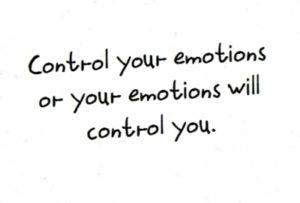 The most crucial element in achieving consistent success as a Forex trader is mastering your emotions. This article aims to offer valuable guidance on how you can begin to control your emotions and set yourself on the path to successful Forex trading.
The most crucial element in achieving consistent success as a Forex trader is mastering your emotions. This article aims to offer valuable guidance on how you can begin to control your emotions and set yourself on the path to successful Forex trading.
The ability to make objective decisions unaffected by emotions is the foundation of successful Forex trading. Many traders allow their feelings to influence their actions when dealing with the market. Overcoming this tendency and separating our emotions from our trading decisions is the key to developing a successful trading mindset.
In this article, we will explore the shared biological characteristics that enable us, as humans, to make emotional trading mistakes and also overcome them through proper training and knowledge. While acknowledging the psychological challenges inherent in Forex trading, we will provide practical insights into why each one of us has the potential to become a successful Forex trader. Additionally, we will share some tips on how you can attain this seemingly elusive trading success.
The Clash of Cognitive Functions
In the realm of evolutionary biological psychology, it is widely recognized that the frontal lobe, the newest part of our brain, is responsible for our capacity for complex reasoning and planning. On the other hand, our older brain structures, developed to serve us well in early human existence, are primarily designed for fight or flight responses, which proved advantageous for thousands of years and still, hold relevance in certain aspects of modern life. However, it is precisely these fight or flight brain structures that pose challenges when it comes to trading in financial markets.
The predicament arises from the fact that our fight or flight brain structures prompt emotion-driven or instinctive trading. The issue lies in the difficulty of maintaining objective and logical thinking when our bodies are prepared for action, adrenaline is surging, and we are in a fight or flight state. Trading involves a delicate situation where our fight or flight brain structures can easily override our frontal lobe intellect and reasoning, which is more objective and profound in nature. Our older brain structures and nervous system are wired to take over in the face of danger, bypassing the need for conscious thought. For instance, if you accidentally touch a stove burner that you mistakenly believed to be turned off, you won’t pause to ponder your actions; instead, you will instinctively withdraw your hand and likely scream without a second thought.
As Forex traders, it is crucial to grasp these fundamental principles of how our brains function. Once we find ourselves caught in the cycle of emotional or fight or flight trading, escaping its grip becomes exceedingly challenging. It often takes losing a significant portion, if not all, of our funds to “snap” out of the emotional trading cycle.
Achieving Trading Success through Mind and Emotional Control
 Traders are frequently advised to control their emotions in order to succeed. However, the guidance often lacks practical instructions on how to accomplish this. Different trading scenarios call for specific techniques to manage emotions effectively. Since trading involves the constant fluctuation of market movements and the potential gains or losses of one’s invested funds, it is crucial not to be swayed by this natural ebb and flow once a trade is initiated. Even if you diligently manage risk and allocate only a small portion of your account to each trade, observing the trade as it unfolds can trigger emotional responses from your “old” brain.
Traders are frequently advised to control their emotions in order to succeed. However, the guidance often lacks practical instructions on how to accomplish this. Different trading scenarios call for specific techniques to manage emotions effectively. Since trading involves the constant fluctuation of market movements and the potential gains or losses of one’s invested funds, it is crucial not to be swayed by this natural ebb and flow once a trade is initiated. Even if you diligently manage risk and allocate only a small portion of your account to each trade, observing the trade as it unfolds can trigger emotional responses from your “old” brain.
This is why thorough trade planning is essential before entering a trade. Leave no stone unturned and cover all aspects before putting your money on the line. Once the trade is executed, it is best to let it play out with minimal involvement. The key to avoiding trading based on the impulses of our more primitive fight or flight brain structures and instead engaging the objective-thinking frontal lobe is to ensure that your trade is meticulously planned before execution.
To “outsmart” your own brain, recognize and accept that you will never be more objective and logical than when you are not in a trade. Thus, this is the optimal time to plan your trade. Sustaining an objective mindset for as long as possible is the key to consistent profitability as a trader. Your ability to remain objective directly impacts your trading accuracy, and objectivity is achieved by planning your trades in advance and refraining from excessive monitoring as they unfold. It is important to understand that there is an inverse correlation between the time spent observing the markets and trading success, assuming a basic level of Forex trading knowledge. Spending excessive time beyond this level, whether analyzing market variables or continuously monitoring trades, can lead to long-term financial losses.
Simplicity versus Complexity in Trading
In addition to planning trades beforehand and refraining from unnecessary interference, another significant factor in maintaining objectivity and utilizing our advanced frontal lobe during trading is employing a simple trading approach. Many Forex traders hinder themselves by attempting to use overly complex trading systems that clutter their charts with lagging indicators or intricate software programs. Once confusion or frustration sets in with your trading method, the likelihood of emotional trading increases, leading to decreased objectivity and ultimately financial losses. It is crucial for Forex traders to strive for clear thinking when making trading decisions and avoid triggering their fight or flight brain structures.
The most effective way to achieve simplicity and clarity in trading is through price action analysis. By utilizing straightforward price action setups to navigate the market, we significantly enhance our chances of maintaining objectivity, remaining calm, and ultimately being profitable. Choosing to learn and implement price action setups on a simple, uncluttered price chart is a decision that greatly reduces the risk of succumbing to emotional trading mistakes. Furthermore, it involves adopting a “set and forget” approach to trades, meaning that you plan your trades before entering them and resist the urge to unnecessarily meddle with them afterwards. We all possess the ability to make these decisions; the key lies in our willingness to embrace them, which unfortunately, most traders do not. Therefore, the first step to differentiating yourself from the majority of losing traders is to acquire an education in a simple yet effective trading method, such as price action trading.

